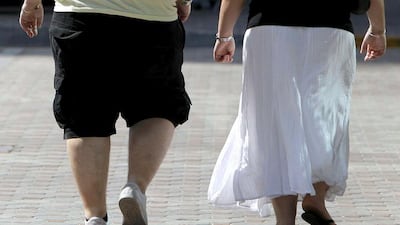Once weighing a hefty 140kg, Mohammed, 30, is one of a growing number of Emiratis now facing the serious health consequences of his size.
His case has become all too familiar to medics in the UAE and around the world, as hospitals battle with the issue of rising obesity rates.
In one recent study, 50 per cent of Emirati men aged 18 were found to be overweight or obese, with 41 per cent showing early signs of diabetes.
The same survey of 33,000 Emirati men also found 71 per cent of those aged between 18 and 29 were overweight.
Today, Mohammed, who did not want to give his full name, is taking steps to address his obesity.
Like thousands of others his size, the cause of his weight is entirely self-inflicted, with a love of fast food an obvious culprit.
In April this year, surgeons performed an operation to insert a sleeve gastrectomy to reduce the size of his stomach and his appetite.
His weight has since dropped to 120kg, but he remains a long way off his goal of between 80 and 100kg.
“[Before the operation] I was eating all kinds of food especially fast food; usually three or four meals a day,” Mohammed, from Ras Al Khaimah, said.
“I didn’t have any problems but there were prospects for future problems such as diabetes and high blood pressure.
“Now my diet has changed completely and I only eat food which will help me to lose weight. I’ve given up fast food completely.”

This month, the charity Cancer Research UK warned that bowel, kidney, ovarian and liver cancers were now more likely to be caused by being overweight than through smoking.
It said millions of individuals were at risk of the disease due to their weight, and that obese people outnumbered smokers two to one.
Dr Girish Juneja, bariatric centre director at Dubai's Al Zahra Hospital, is all too well aware of the rising epidemic of overweight patients.
He has performed more than 700 weight loss procedures since April 2014, and laments how many patients opt for expensive surgery over a commitment to essential lifestyle changes.
The results of the surgery are often short-lived, and as the weight returns some patients choose a second, third or even fourth procedure.
“Obesity is now a significant problem in society, but not just for Emiratis,” said Dr Juneja.
“There are multiple reasons related to lifestyle, availability of cheap food, laziness and a lack of exercise.
“We rarely see obese patients who have a genetic malformation that has caused their condition.”
Dr Juneja’s centre offers two types of corrective, weight loss procedures, but only after a patient makes a concentrated effort to diet and take regular exercise.
He said if individuals had tried and failed to reduce their weight, the clinic would offer either surgery or non-surgical treatment through medication.
Their threshold for surgical procedures is a BMI of 35 — a healthy BMI for adults ranges from between 18.5 to 24.9 — or if a patient has started to develop complications such as high blood pressure or diabetes.
Dr Juneja, who has been treating bariatric patients for 15 years, said about 55 per cent of his patients were female and 45 per cent male.
“We try to do keyhole surgery to reduce the size of the stomach or [carry out] a gastric bypass,” he said. “It reduces appetite so the patient eats smaller portions of food.
“I'm seeing a lot of younger people who are obese and requiring treatment. Most have acquired their parental habits of bad diet and no exercise.”

If patients have a BMI of under 35 and do not qualify for surgery, they can choose alternative procedures.
Gastric balloons can be inserted into the stomach via a pill or through use of an optical instrument known as an endoscope.
Once in the stomach the balloon is inflated to restrict appetite and patients can lose between 15 and 22kg within three to four months. The surgery can cost up to Dh50,000.
Dr Ayman Soliman, a bariatric consultant at Zulekha Hospital in Dubai, said UAE medics were struggling to keep up with demand for corrective surgery.
He revealed the number of patients he had treated surgically for obesity had risen 425 per cent in just three years, from 120 procedures in 2015 to 630 in 2017.
He also said some of his patients had returned for a third or even fourth procedure after putting weight back on.
"We are accumulating patients from the long waiting list at government hospitals," he told The National.
“Many obese patients have regained the weight lost from earlier surgeries.
“The aim is to treat obesity, not only to operate for obesity. Surgery is not everything, as patient behaviour and lifestyle are the important points to stress.”


